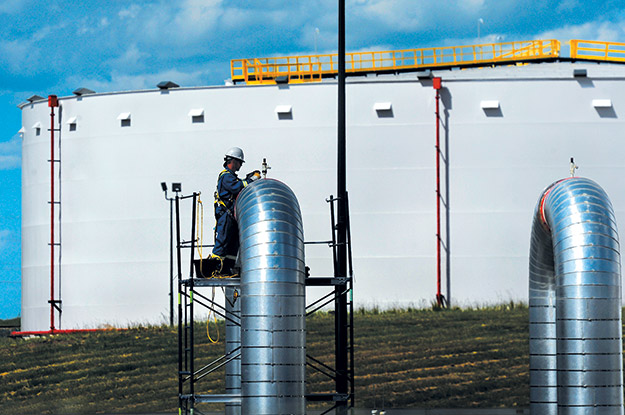Until this year, Alberta was known as Canada’s most conservative province. But in May, Albertans elected for the first time the left -of-center New Democratic Party (NDP) to run their government.
The huge change at the top for Canada’s fourth-largest province in terms of population — and the country’s leading petroleum producer — will have ramifications both nationally and internationally. And it raises questions about the historically strong alliance between the provincial government and the oil and gas industry.
The NDP win in Alberta has given the federal wing of the party quite a bounce. At the time of writing, a close three-way race among the governing Conservative Party, Liberal Party and the NDP was anticipated for the October 19 federal election in Canada. The NDP had never led the national government in Canada’s history.
Meanwhile, the petroleum industry in Alberta has taken a cautious approach to the new government — even though the new premier, Rachel Notley, has assured industry leaders that her government wants to work collaboratively with them.
Notley made clear even before her party won the majority of seats in the provincial legislature that the NDP would have a much different approach to the province’s main industry than her predecessors, the Progressive Conservative Party of Alberta (PC), which had been in power for 44 years. Before the PCs, the Alberta Social Credit Party, another conservative party, held power for 35 years.
One of the first things the new premier did was double the levy on industrial carbon emissions to about $22.50 a tonne. She also appointed Andrew Leach, a high-profile energy and environmental economist at the University of Alberta, to head a commission to make recommendations on new climate change policies.
Meanwhile, Notley has yet to announce what her government intends to do about curbing carbon emissions. Alberta tar sands extraction projects account for about 8 percent of Canada’s total emissions and, with more projects coming on stream, the percentage is likely to rise to almost 40 percent. She is planning to attend the United Nations Conference on Climate Change in Paris in December—a first for an Alberta premier.
The NDP government will also have a different attitude toward pipeline development, particularly those pipelines that are slated to carry thick diluted bitumen and have been the focus of controversy in both Canada and the United States over the past few years.
In the past, the Alberta government not only vociferously supported pipeline development, but spent millions of dollars promoting Alberta’s oil to various markets. The government was particularly aggressive about the Keystone XL pipeline, a $6 billion project that would pipe diluted bitumen from Alberta to refineries in the Gulf of Mexico, even though there is substantial opposition to it in the United States.
The new premier says she doesn’t support construction of the Keystone XL pipeline and will not be lobbying for it in Washington as her predecessors did. Her government has so far not recalled its Washington envoy, former Conservative politician Rob Merrifield, who was appointed by former Premier Jim Prentice. But it is unlikely that any Alberta envoy will now be forging close ties with Republican politicians who promote the oil and gas industry, as happened when President George W. Bush and Vice President Dick Cheney were in the White House.
However, Notley is not completely anti-pipeline. She favors the proposed Energy East pipeline that would carry bitumen from Alberta to Canada’s east coast, and the Trans Mountain pipeline that would carry bitumen to the southern coast of British Columbia where oil tankers have long been plying the waters.
Notley has also increased corporate taxes from 10 percent to 12 percent. One major oil company, Canadian Natural Resources Limited, has already publicly blamed the tax increase for its second quarter net loss of about $303 million in 2015.
There’s no question that oil-rich Alberta is taking a different approach to issues like climate change, environmental regulation and pipeline development than in the past. No longer can the oil industry count on government to give it unqualified support. And no longer will the provincial government be the industry’s loudest promoter.
—
Gillian Steward is the former managing editor of the Calgary Herald and a columnist for the Toronto Star who writes about western Canada.



